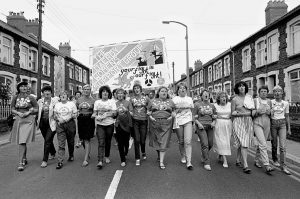By Natalie Thomlinson //
Natalie Thomlinson is Lecturer of Modern British Cultural History at the University of Reading. Natalie is currently Co-Principal Investigator on an AHRC-funded project, Women in the Miners’ Strike, 1984-5. You can read more about the project and its findings here.
The research for this post comes from a large AHRC-funded project I am undertaking alongside Florence Sutcliffe Braithwaite and Victoria Dawson at UCL, entitled Women in the Miners’ Strike: 1984 -5: Charting changing gender roles in working-class communities in post-war Britain. For this, we have undertaken around 85 life-history interviews with women born between c.1940 and c.1970 from coalfield communities across Britain, asking them not just about the strike but about their life course more broadly. This has given us a more comprehensive picture of the changes in working class women’s lives across the period and a sense of how education has featured in their life trajectories.
Most of our interviewees attended their local secondary modern or comprehensive schools. Some went to grammar schools. The majority, though certainly not all, went to single-sex schools. But whichever type of school they went to, the women we talked to all had experiences that were profoundly shaped by the intersection of their class and gender, and by broader social expectations of the sort of lives that working-class girls would go on to lead.
Sexism was not often experienced through directly negative encounters with male pupils or staff, but rather through the subtleties of low aspirations for girls. Most women reported that as children and teenagers they had expected – and were expected by those around them – to lead a life similar to that of their mothers, focused on domesticity and childrearing. They did not expect, in other words, to lead lives that were characterised by high levels of participation within the paid labour force; the employment that they had anticipated before marriage was generally the sort of poorly paid, unskilled work available to young women in mining areas. This meant that gaining qualifications at school was perceived to be of minimal relevance to many in our sample. Indeed, those who finished their secondary education from the 1950s to the early-1970s were often not entered for exams at all, although this started to change over the following decade. Therefore, many left school at the earliest possible moment, perhaps earning money in a factory, shop, or – at best – a low-grade clerical job, before settling down with a local lad (usually a miner in the case of our sample) a few years later.

Above: Maerdy Women’s Support Group (1984), courtesy and copyright of Martin Shakeshaft
In many ways, our sample’s early educational experiences demonstrate why, to paraphrase Paul Willis, ‘working-class girls got working-class jobs’ upon leaving school, even if quite a number came to experience a limited degree of social mobility later in life. It is also notable that education played a more peripheral role in the narratives of the working-class women we interviewed than those of more middle-class women I have undertaken oral histories with for previous research projects. While, perhaps, the moment of leaving university marked the graduation into adulthood for many middle-class women of the late twentieth century, for the women in our sample, work and marriage – rather than education – were the events that marked the transition to maturity. [1]
While school friendships were often remembered positively, as were some subjects and teachers, on the whole school was something to be endured rather than enjoyed, a staging post on the way to the real business of adult life. Those who did enjoy school tended to be those who had been academically able, such as Linda Chapman. After moving from the North East to Slough in the 1970s, she went to a grammar school, joking ‘I was Sadie Swot!’ Others, however, remembered school as a place where teachers made them feel stupid, insignificant, and poor. Here, we might want to think about the ‘hidden injuries of class’ within a school setting. [2]
Aggie Currie from Doncaster, for example, remembered of her primary and secondary modern school teachers in the 1950s and 60s that:
‘If your uniform came from Marks and Spencer, you were first choice for the teacher. If you were one of them kids whose uniform came from the market or jumble sale, they didn’t want to know. And I was one of them kids.’
Aggie was consistently classed as a trouble maker at school. Listening to her interview, it is hard not to draw the conclusion that the miners’ strike allowed her, for the first time, to put this label to good use: she was arrested fourteen times between 1984-5, with this sense of standing up to authority clearly central to her sense of self.
Similarly, Pippa Morgan* passed her eleven-plus in South Wales in the early 1970s, but was so unhappy at her grammar school that after a few months she refused to go. Her unhappiness was such that she was referred to a child psychiatrist, who recommended that she was transferred to the local secondary modern. She remembered that:
‘That was like a class thing. You know the grammar school, people were so, I don’t know, snobby for want of a better word, and they’d pick on everything you’d done […] I remember I had my ears pierced twice and there was big fuss. Different things, down to clothes, colour of your hair, things like that. And then when I went to this school [the secondary modern], you know, it was…normal.’
She was much happier at her new school – but she also left at 16 with no qualifications to embark on years of poorly paid and low skilled work. Even Linda Chapman, who enjoyed her experiences at the grammar school in Slough, reported feeling a sense of not belonging, surrounded by girls whose parents did professional jobs and lived in ‘posh’ commuter belt villages. She too left at 16 and worked in a bank. Looking back at her life during the interview, Linda felt that it was not a bad job, but that she could have done better, expressing regret that no-one encouraged her to stay on into the sixth form.

Above: Women Against Pit Closures logo (1984-85)
Such a trajectory was common for many of those who had gone to grammar schools in our sample; they were more likely to attain qualifications, but often did not stay on into the sixth form. Attendance at grammar school was generally seen to be a route to securing white collar employment, rather than as a prelude to university attendance (unsurprising, given the extremely low numbers of working class women attending university before the 1980s). As Jean Shadbolt in Nottinghamshire recalled of her experience in the 1960s:
‘I wanted to do something arty…but…this is the other thing with my parents, neither of them ever said to me “Come on! You can do this!”, you know. Once I reached fifteen, and could have left school legally, they didn’t really mind whether I went to school or not. Even though I was doing my O Levels, there was never any “are you to revise? What exam have you got?” They didn’t care […] as long as I didn’t go into a factory, that’s all they were bothered about. Once I got an office job, in their eyes, I’d arrived.’
Indeed, the sense of regret some of our women expressed about ‘messing around’ at school, or not making the most of the opportunities they perceived their younger-selves to have had, weighed heavily in a few of the interviews. From some women, I got the melancholy sense that, to them, I – also from a mining community and having attended similar sorts of schools – represented the ‘path not taken’; or at least the apparently greater opportunities available to women of my generation. Eating with one woman, who had reported such educational regrets, after the interview had finished, I was asked what university I had gone to. When I replied, she exclaimed ‘I never thought someone with your accent would have gone to Oxford!’ She had a regional accent herself, so didn’t mean it snobbishly; rather, the idea of someone from the comprehensive school she had gone to during the 1970s attending an elite university was as unthinkable as going to the moon.
Yet I was also keenly aware that, with parents who worked in education, I had grown up with the cultural capital needed to ‘get on’ in the school system; they taught me the game and how to play it. For our interviewees to blame themselves for not making the most of their schooling raises the question of why, precisely, working-class girls growing up in mining areas would have had much incentive to do so in the first place? They expected to do jobs that required few or no qualifications before becoming housewives, were rarely encouraged towards academic success by their teachers or schools, and were not entered for the exams that might have opened alternative pathways.
Ironically, of course, many of our interviewees’ teenage expectations about their future participation in the paid labour force proved to be wrong, as women increasingly entered the workplace in huge numbers towards the end of the twentieth century. Some of our interviewees ended up returning to education through the work they did, a not uncommon way for women from working-class backgrounds to gain qualifications in late twentieth-century Britain. Climbing the ladder at the workplace, and perhaps gaining qualifications that furthered their careers along the way, was the most common story of social mobility in our sample.
Linda Chapman, for example, studied for a degree in Business and Human Resources through her role working in the Personnel Department for the mobile phone company Orange (who she described as ‘fantastic’). Most education that genuinely allowed women to gain further career opportunities occurred after a return to college as mature students, not as teenage girls. The heady myth of the grammar-school boy and girl ‘getting on’ and ‘climbing the ladder’ in post-war Britain still holds an astonishing purchase over the popular imagination. Even so, those who had achieved some form of social mobility in our sample had overwhelmingly done so in spite of, and not because of, their early schooling.
* This is a pseudonym
[1] Paul Willis, Learning to Labour: How Working Class Kids Get Working Class Jobs (London: Saxon House, 1978).
[2] Beverley Skeggs, Formations of Class & Gender: Becoming Respectable (London: SAGE, 1997).
Your comments about understanding the game and how to play it resonated with research I have conducted in secondary schools in Everton, Liverpool between 1944 and 1979, It was clear that for both boys and girls the social capital gap was instrumental in some of the educational decisions being made as well as expectations of teachers and the local community.
Uniform was seen as an issue for those passing into the grammar school system but there was a consistent framing of consistency of experience – ‘we were all the same, nobody had anything different.’
My research is qualitative and based on 10 detailed cases – it may add some colour to the wider narrative if you would be interested.